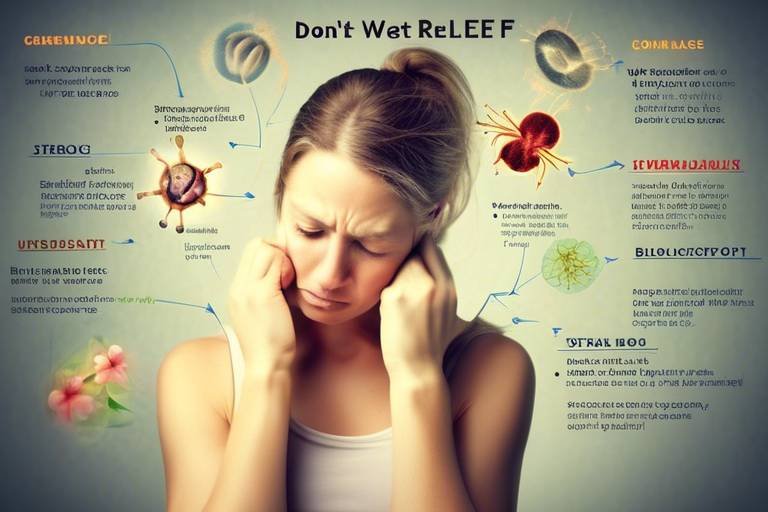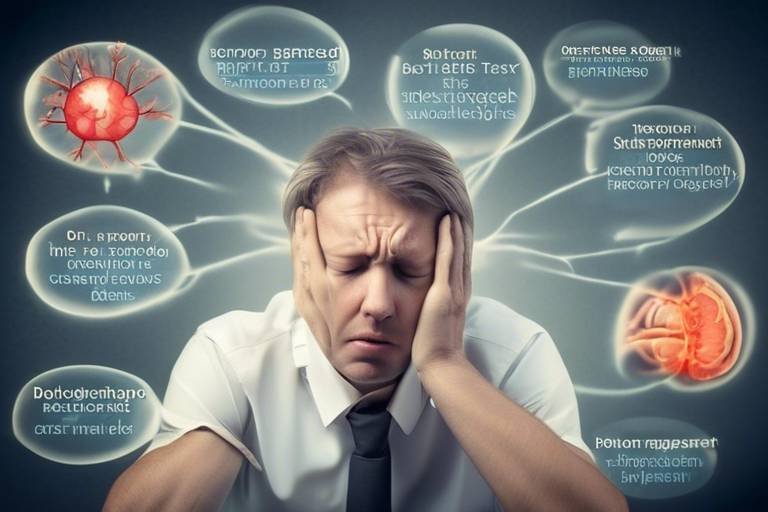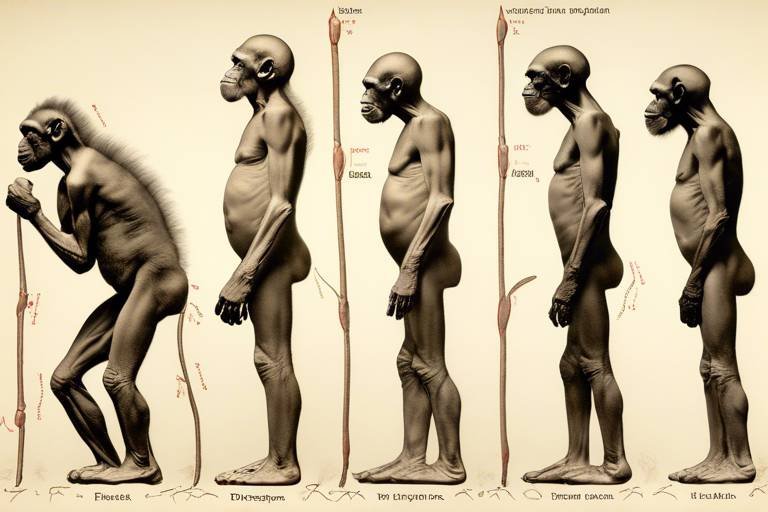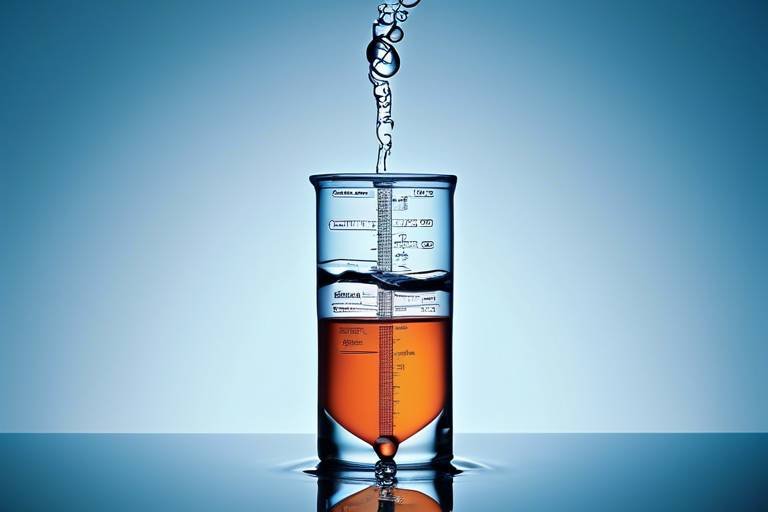How Caffeine Affects Your Body - The Science Behind It
Caffeine is more than just a morning ritual; it's a powerful stimulant that many of us rely on to kickstart our day. But have you ever wondered how this seemingly magical substance affects your body? In this article, we will dive deep into the multifaceted effects of caffeine, exploring its benefits, drawbacks, and the intricate science that explains its impact on various physiological functions. Whether you're a coffee lover or an energy drink enthusiast, understanding how caffeine works can help you make informed choices about your consumption.
Caffeine primarily operates by blocking adenosine receptors in the brain. Adenosine is a neurotransmitter that promotes sleep and relaxation, so when caffeine steps in and blocks these receptors, it leads to increased alertness and wakefulness. Think of it as a gatekeeper, preventing the sleepy signals from reaching your brain. This mechanism is why caffeine is such a popular stimulant; it effectively tricks your brain into feeling more awake and energized. But there's more to the story—caffeine also stimulates the release of other neurotransmitters like dopamine and norepinephrine, enhancing mood and cognitive function.
In the short term, caffeine can be a game-changer. It can enhance your mood, boost concentration, and even improve physical performance. Imagine you're dragging through your day, and then you sip on your favorite coffee. Suddenly, you're alert, focused, and ready to tackle that mountain of work. This immediate boost is precisely why caffeine is a go-to choice for many seeking a quick energy lift. Studies have shown that caffeine can improve reaction times and increase endurance during workouts, making it a favorite among athletes and busy professionals alike.
While moderate caffeine consumption can have its perks, excessive intake may lead to negative health outcomes. Long-term effects can include increased heart rate and heightened anxiety levels. It’s essential to find a balance. For instance, some research suggests that heavy caffeine consumption might be linked to heart issues, especially in individuals with pre-existing conditions. Understanding these potential risks can help you manage your caffeine intake better. Remember, moderation is key!
As you consume caffeine regularly, your body can develop a tolerance, meaning you might need to drink more to achieve the same effects. This phenomenon can lead to a cycle of dependence, where your body becomes reliant on caffeine to function normally. It’s similar to building a tolerance to a medication; over time, the initial dose just doesn’t cut it anymore. This section examines how caffeine dependence develops and its implications for daily life, including withdrawal symptoms like headaches and irritability if you skip your usual dose.
One of the most significant downsides of caffeine is its impact on sleep quality. Consuming caffeine, especially in the afternoon or evening, can disrupt your sleep patterns, affecting both the duration and quality of your rest. If you've ever found yourself tossing and turning after a late cup of coffee, you know exactly what we mean. Understanding this relationship is crucial for those looking to improve their sleep hygiene. Experts recommend limiting caffeine intake to earlier in the day to avoid these disruptions.
Athletes often turn to caffeine as a performance enhancer. Research has shown that caffeine can improve endurance, strength, and overall athletic capabilities during physical activities. It acts as a fuel source, helping to stave off fatigue and increase stamina. Imagine running a marathon; a little caffeine could give you the extra push you need to cross that finish line. This section delves into how caffeine affects not just endurance but also strength training, making it a popular choice in the fitness community.
Caffeine is found in a variety of foods and beverages, from coffee and tea to chocolate and energy drinks. Here are some common sources of caffeine:
- Coffee: Typically contains about 95 mg of caffeine per 8 oz.
- Tea: Varies widely, but generally has about 30-50 mg per 8 oz.
- Energy Drinks: Can contain anywhere from 50 to over 300 mg per serving.
- Chocolate: Contains small amounts, around 20 mg per ounce.
Knowing where your caffeine is coming from can help you manage your intake effectively.
Understanding how much caffeine is safe to consume is essential for your health. Most health experts recommend a daily limit of about 400 mg for most adults, which is roughly equivalent to four 8 oz. cups of brewed coffee. However, individual tolerance levels can vary significantly based on factors like age, weight, and overall health. It's always a good idea to listen to your body and adjust accordingly.
The relationship between caffeine and mental health is complex and can vary from person to person. For some, caffeine can boost mood and alertness, while for others, it may exacerbate anxiety and lead to jitteriness. It's crucial to understand how caffeine affects your mental well-being. If you’re prone to anxiety disorders, you might want to monitor your caffeine intake closely, as it can sometimes intensify symptoms. Finding that sweet spot where caffeine enhances your mood without tipping you over the edge is key.
Q: Can I develop a caffeine addiction?
A: Yes, regular consumption can lead to dependence, where you may experience withdrawal symptoms if you stop suddenly.
Q: Is caffeine safe for everyone?
A: While moderate caffeine intake is safe for most adults, individuals with certain health conditions should consult their doctor.
Q: How long does caffeine stay in my system?
A: Caffeine can stay in your system for several hours, with a half-life of about 3 to 5 hours in most people.
Q: Can caffeine affect my sleep?
A: Yes, consuming caffeine too close to bedtime can disrupt your sleep patterns and reduce sleep quality.

The Mechanism of Caffeine
Caffeine is more than just a morning pick-me-up; it's a fascinating compound that interacts with our brain in intricate ways. At its core, caffeine operates by blocking adenosine receptors. Adenosine is a neurotransmitter that promotes sleep and relaxation. When you consume caffeine, it competes with adenosine for these receptors, effectively reducing feelings of tiredness and increasing alertness. Imagine adenosine as a cozy blanket that makes you feel drowsy, while caffeine is like a playful puppy tugging at that blanket, keeping you awake and engaged.
But the effects of caffeine don't stop there. By blocking adenosine, caffeine triggers the release of other neurotransmitters such as dopamine and norepinephrine. This cascade of chemical reactions not only enhances mood but also boosts concentration and focus. It's akin to flipping a switch that turns on your brain's "go" signal, allowing you to tackle tasks with renewed vigor.
To truly appreciate the mechanism of caffeine, it's essential to understand how it affects various physiological functions:
- Increased Heart Rate: Caffeine can stimulate the heart, leading to a quicker pulse. This can provide a sense of energy, making you feel more alert.
- Enhanced Physical Performance: By increasing adrenaline levels, caffeine prepares your body for physical exertion, making it a favorite among athletes.
- Improved Cognitive Function: The boost in neurotransmitter activity can lead to sharper thinking and better problem-solving abilities.
Interestingly, the effects of caffeine can vary significantly from person to person, influenced by factors such as genetics, tolerance, and overall health. While some may feel the energizing effects within minutes, others might take longer to notice any changes. This variability is part of what makes caffeine so intriguing.
Furthermore, the method of consumption plays a crucial role in how caffeine affects the body. For example, drinking a cup of coffee might lead to a quick spike in energy, while consuming caffeine in the form of a chocolate bar may result in a slower, more gradual effect. Each source of caffeine has its own unique profile, which can influence how you experience its benefits.
In summary, understanding the mechanism of caffeine reveals why it has become such a beloved stimulant worldwide. It not only blocks adenosine but also enhances various neurotransmitters, leading to improved mood, focus, and physical performance. So, the next time you sip that cup of coffee, remember that you're not just enjoying a beverage; you're engaging in a complex dance of chemistry that energizes your body and mind.
Q: How long does caffeine stay in your system?
A: Caffeine has a half-life of about 3 to 5 hours, meaning it can take up to 10 hours for it to be mostly eliminated from your body.
Q: Can I become dependent on caffeine?
A: Yes, regular consumption can lead to tolerance and dependence, making it necessary to consume more to achieve the same effects.
Q: Is caffeine safe for everyone?
A: While moderate caffeine intake is generally safe for most people, individuals with certain health conditions should consult a healthcare professional.

Short-Term Effects of Caffeine
Caffeine is like a superhero for our daily grind, swooping in to save the day when we need a quick pick-me-up. It’s no wonder that millions of people reach for their favorite caffeinated beverage each morning. But what exactly happens in our bodies when we indulge in that cup of coffee or tea? In the short term, caffeine can have a plethora of effects that can transform our mood and mental state. Let’s dive into this fascinating world of caffeine and its immediate impact on our bodies.
One of the most notable effects of caffeine is its ability to enhance mood. Have you ever noticed how a warm cup of coffee can feel like a hug in a mug? That’s because caffeine stimulates the release of neurotransmitters like dopamine and serotonin, which play a crucial role in regulating our mood. This can lead to feelings of happiness and increased motivation, making it easier to tackle that daunting to-do list.
But wait, there’s more! Caffeine also boosts concentration and focus. It’s like turning the volume up on your brain's ability to process information. Studies have shown that caffeine can improve attention span and cognitive function, allowing you to stay sharp during long meetings or while studying for exams. Imagine being able to absorb information like a sponge—caffeine can help make that happen!
Moreover, caffeine has a significant impact on physical performance. Athletes often swear by their pre-workout coffee, and for good reason. Caffeine can enhance endurance and strength, giving you that extra push to power through a tough workout. It increases adrenaline levels, which can lead to improved physical performance, making it a favorite among fitness enthusiasts. In fact, many studies suggest that caffeine can delay fatigue, allowing you to exercise longer and harder.
However, it’s essential to remember that while caffeine can provide these immediate benefits, moderation is key. Too much caffeine can lead to unwanted side effects such as jitters, increased heart rate, and anxiety. It’s like riding a roller coaster; the thrill can be exhilarating, but if you go too fast, it can quickly turn into a chaotic experience. So, while caffeine can be your best friend in the short term, it’s important to keep an eye on how much you consume.
In conclusion, the short-term effects of caffeine can be incredibly beneficial, enhancing mood, concentration, and physical performance. It’s a powerful stimulant that can help us tackle our daily challenges with vigor. Just remember to enjoy it wisely, and you’ll reap the rewards without the roller coaster ride of negative side effects!
- How quickly does caffeine affect the body? Caffeine typically starts to affect your body within 15 minutes of consumption, peaking around 30 to 60 minutes after intake.
- Can caffeine improve my workout performance? Yes, many athletes use caffeine to enhance endurance and strength, allowing for improved workout performance.
- Is there a safe limit for caffeine intake? The general guideline is up to 400 mg of caffeine per day for most adults, which is roughly equivalent to four 8-ounce cups of brewed coffee.

Long-Term Effects of Caffeine
Caffeine is often hailed as a miracle worker for its ability to boost energy and enhance focus. However, when consumed over an extended period, its effects can become more complex, revealing both benefits and drawbacks. Understanding these long-term effects is crucial for anyone who relies on caffeine to power through their day.
On one hand, moderate caffeine consumption has been linked to several health benefits. Research suggests that it may reduce the risk of certain diseases, such as Parkinson's and Alzheimer's. The antioxidants found in coffee and tea can contribute to overall health, potentially lowering inflammation and improving heart health. However, these benefits are typically seen with moderate intake, which is generally considered to be around 3 to 4 cups of coffee per day.
On the flip side, excessive caffeine consumption can lead to a host of negative health outcomes. For instance, studies have shown that high doses of caffeine can elevate heart rate and blood pressure, putting additional strain on the cardiovascular system. This can be particularly concerning for individuals with pre-existing heart conditions. Furthermore, chronic high intake can lead to increased anxiety levels, as caffeine stimulates the nervous system, making it harder for some people to relax.
Another long-term consequence of caffeine consumption is the potential impact on bone health. Some research indicates that excessive caffeine may interfere with calcium absorption, which can be detrimental to bone density over time. This is especially important for older adults, who are already at risk for osteoporosis. Therefore, balancing caffeine intake with adequate calcium consumption is essential.
Moreover, the relationship between caffeine and mental health cannot be overlooked. While some individuals may experience improved mood and cognitive function with moderate consumption, others may find that high caffeine intake exacerbates anxiety and stress levels. This can create a vicious cycle where individuals consume more caffeine to counteract fatigue, only to find themselves feeling more anxious as a result.
In summary, the long-term effects of caffeine are multifaceted and can vary significantly from person to person. It is essential to consider individual health conditions and lifestyle factors when determining an appropriate level of caffeine consumption. As always, moderation is key.
- How much caffeine is considered safe for daily consumption? Most health experts recommend limiting caffeine intake to about 400 mg per day, which is roughly equivalent to four 8-ounce cups of brewed coffee.
- Can caffeine lead to addiction? Yes, regular caffeine consumption can lead to dependence, causing withdrawal symptoms such as headaches, fatigue, and irritability when not consumed.
- Does caffeine affect sleep? Yes, caffeine can disrupt sleep patterns, leading to difficulties in falling asleep and staying asleep, especially if consumed later in the day.
- Are there any benefits to caffeine? Moderate caffeine consumption has been linked to various health benefits, including improved cognitive function and a lower risk of certain diseases.

Caffeine Tolerance and Dependence
Caffeine is like that friend who always shows up when you need a pick-me-up. But what happens when this friendly stimulant starts to lose its charm? That’s where the concepts of tolerance and dependence come into play. Over time, your body can become accustomed to caffeine, requiring you to consume more to achieve the same energizing effects. This phenomenon is known as caffeine tolerance. Imagine it like a video game: at first, a few power-ups give you a significant boost, but eventually, you need to level up your game to feel the same thrill.
When you regularly consume caffeine, your brain begins to adapt. The adenosine receptors, which caffeine blocks to keep you alert, may start to multiply. This means that your body is literally asking for more caffeine to feel the same jolt of energy. It’s a bit like trying to fill a bucket with a hole in it—the more you pour in, the more it leaks out. You might find yourself reaching for that extra cup of coffee or energy drink just to feel “normal.”
But what about dependence? This is where things can get a little tricky. As you increase your caffeine intake, your body starts to rely on it to function properly. When you skip your usual dose, you might experience withdrawal symptoms such as headaches, fatigue, irritability, and even difficulty concentrating. Suddenly, your morning routine feels incomplete without that cup of joe. It’s akin to a security blanket that you can’t bear to part with. The body becomes conditioned to expect caffeine, and when it doesn’t get it, the fallout can be uncomfortable.
It’s important to note that not everyone will develop a significant tolerance or dependence on caffeine. Factors such as genetics, lifestyle, and overall health play a role in how your body reacts. Some people can sip on a single cup of coffee a day and feel energized, while others might find themselves in a caffeine arms race, constantly upping their intake.
To help you understand this better, here’s a quick overview of how caffeine tolerance and dependence can manifest:
| Aspect | Caffeine Tolerance | Caffeine Dependence |
|---|---|---|
| Definition | Reduced response to caffeine over time | Physical reliance on caffeine for normal functioning |
| Symptoms | Need for higher doses to feel effects | Withdrawal symptoms when caffeine is reduced or stopped |
| Duration | Can develop within days to weeks | Can last for days to weeks after cessation |
| Management | Gradual reduction of intake | Detoxification and gradual reduction |
So, the next time you reach for that third cup of coffee, consider whether you’re fueling your energy or feeding a growing dependence. Moderation is key! Keeping your caffeine intake in check can help you maintain its stimulating effects without falling into the tolerance trap. If you feel like you’ve become too reliant on caffeine, try taking a break. It might just help reset your body’s sensitivity and bring back that initial pep in your step.

Caffeine and Sleep Quality
Caffeine is like that friend who shows up uninvited to a party—exciting at first, but can really throw off the vibe. When it comes to sleep, caffeine can be a significant disruptor. It’s not just about feeling awake; it’s about how that alertness can mess with your sleep cycle. When you consume caffeine, especially later in the day, it can linger in your system for hours, making it harder to fall asleep and stay asleep. This is because caffeine blocks adenosine, a neurotransmitter that promotes sleepiness. The more caffeine you consume, the more challenging it becomes to let your body wind down.
But how does this affect your overall health? Poor sleep quality can lead to a myriad of issues, including reduced cognitive function, mood swings, and even long-term health problems like heart disease. If you’re finding it hard to get a good night’s sleep, it might be time to take a closer look at your caffeine intake. Many people are unaware that caffeine can remain in their system for up to 8 hours or more, depending on individual metabolism and sensitivity.
To illustrate the impact of caffeine on sleep quality, consider the following table:
| Caffeine Source | Caffeine Content (mg) | Half-Life (Hours) |
|---|---|---|
| Coffee (8 oz) | 95 | 4-6 |
| Tea (8 oz) | 47 | 3-5 |
| Energy Drink (8 oz) | 80 | 5-7 |
| Dark Chocolate (1 oz) | 12 | 2-3 |
As you can see, different sources of caffeine have varying levels of caffeine content and half-lives. This means that the timing of your last caffeine fix is crucial. If you’re sipping on a cup of coffee at 4 PM, you might still have a significant amount of caffeine in your bloodstream well into the night. So, what can you do to improve your sleep quality while still enjoying your favorite caffeinated beverages? Here are a few tips:
- Limit caffeine intake in the afternoon and evening.
- Opt for decaffeinated versions of your favorite drinks.
- Pay attention to your body's signals; if you're feeling jittery, it might be time to cut back.
In conclusion, while caffeine can give you that much-needed boost during the day, it’s essential to be mindful of its effects on your sleep quality. Striking a balance between enjoying caffeine and ensuring restful sleep can significantly impact your overall well-being. Remember, a good night's sleep is just as important as that morning cup of coffee!
Q1: How long before bed should I stop consuming caffeine?
A1: It’s generally recommended to stop consuming caffeine at least 6 hours before bedtime to minimize its impact on sleep quality.
Q2: Can caffeine affect my dreams?
A2: Yes, caffeine can lead to more fragmented sleep, which might affect the REM cycle where most dreaming occurs, potentially leading to less vivid dreams.
Q3: Is it possible to become less sensitive to caffeine over time?
A3: Absolutely! Regular consumption can lead to tolerance, meaning you might need more caffeine to achieve the same stimulating effects.

Caffeine's Impact on Physical Performance
Caffeine is not just your morning pick-me-up; it’s a powerhouse when it comes to physical performance. Athletes and fitness enthusiasts alike have harnessed the benefits of caffeine to push their limits and enhance their workouts. But how exactly does it work? Let’s dive into the science behind caffeine's effects on your body during exercise.
When you consume caffeine, it enters your bloodstream and travels to your brain, where it blocks adenosine receptors. This blockade leads to increased levels of adrenaline, the hormone responsible for the 'fight or flight' response. As a result, your body gets a surge of energy, enhancing your performance in various physical activities. Imagine your body as a car; caffeine acts like a turbocharger, giving you that extra boost when you need it most.
Research has shown that caffeine can improve endurance, strength, and overall athletic capabilities. In endurance sports, caffeine can significantly reduce the perception of effort, making it feel easier to maintain prolonged activity. For example, a study indicated that participants who consumed caffeine before a long-distance run were able to run faster and longer than those who did not. This effect can be attributed to caffeine’s ability to mobilize fat stores, allowing the body to use fat as a primary energy source, thus sparing glycogen stores for later use.
In strength training, caffeine can enhance performance by increasing power output and muscle strength. A study found that athletes who ingested caffeine before lifting weights experienced greater gains in strength compared to those who took a placebo. This is particularly beneficial during high-intensity workouts where every lift counts. Think of caffeine as your personal cheerleader, pushing you to lift that extra weight or complete that last rep.
However, the impact of caffeine on performance can vary based on individual tolerance levels and the timing of consumption. For some, a small cup of coffee before a workout can work wonders, while others may need a more substantial dose. The general recommendation is to consume caffeine about 30 to 60 minutes before exercising to maximize its effects. But be cautious; too much caffeine can lead to jitters, increased heart rate, and even nausea, which can derail your workout.
Here’s a quick overview of how caffeine can enhance different aspects of physical performance:
| Performance Aspect | Effect of Caffeine |
|---|---|
| Endurance | Increases time to exhaustion and reduces perceived effort |
| Strength | Enhances power output and muscle strength |
| Recovery | May help in faster recovery post-exercise |
In conclusion, caffeine can be a valuable ally in your fitness journey, offering significant benefits for both endurance and strength training. However, it’s essential to find the right balance for your body. As with any supplement, moderation is key, and understanding your personal response to caffeine will help you maximize its potential in your training regimen.
- How much caffeine should I consume before a workout? It’s generally recommended to consume about 3-6 mg of caffeine per kilogram of body weight 30 to 60 minutes before exercising.
- Can caffeine improve my performance in all types of exercise? Yes, caffeine can enhance performance in both endurance and strength activities, but the effects may vary based on individual tolerance.
- Is it safe to use caffeine regularly for workouts? For most people, moderate caffeine consumption is safe, but it’s essential to listen to your body and adjust accordingly.

Sources of Caffeine
Caffeine is a natural stimulant that can be found in a variety of foods and beverages, making it one of the most widely consumed psychoactive substances in the world. From the rich aroma of freshly brewed coffee to the refreshing taste of iced tea, caffeine is embedded in our daily rituals. But do you know where it really comes from? Let’s dive into the most common sources of caffeine and uncover their caffeine content!
First and foremost, coffee is undoubtedly the heavyweight champion of caffeine sources. A typical 8-ounce cup of brewed coffee can contain between 95 to 200 mg of caffeine, depending on the brewing method and type of coffee bean. This makes it a go-to choice for many who seek a quick energy boost in the morning. However, not everyone is a coffee drinker, and that's perfectly fine because there are plenty of other options!
Tea, for instance, is another popular source of caffeine, though it generally contains less than coffee. An 8-ounce cup of black tea usually has about 40 to 70 mg of caffeine, while green tea contains around 20 to 45 mg. The presence of L-theanine in tea can create a more balanced and calming effect compared to the jitteriness often associated with coffee.
And let’s not forget about chocolate. Yes, that delightful treat also packs a caffeine punch! Dark chocolate, in particular, has a higher caffeine content compared to milk chocolate. For example, a 1-ounce serving of dark chocolate can contain about 20 to 30 mg of caffeine. So, if you’re looking for a sweet way to get your caffeine fix, chocolate might just be your best friend.
Energy drinks have surged in popularity over the last couple of decades, and they often contain high levels of caffeine. A typical 16-ounce energy drink can range from 160 to 300 mg of caffeine, depending on the brand and formulation. However, it’s essential to consume these drinks with caution, as they can also include high sugar content and other stimulants that might lead to adverse effects.
For those who prefer a more herbal approach, certain herbal teas like yerba mate and guarana are also rich in caffeine. Yerba mate can contain about 30 to 50 mg of caffeine per cup, while guarana, often found in energy supplements, can have up to 120 mg of caffeine per teaspoon! These sources offer unique flavors and health benefits, making them popular among health enthusiasts.
Here’s a quick reference table summarizing the caffeine content in some popular sources:
| Source | Caffeine Content (mg) |
|---|---|
| Coffee (8 oz) | 95 - 200 |
| Black Tea (8 oz) | 40 - 70 |
| Green Tea (8 oz) | 20 - 45 |
| Dark Chocolate (1 oz) | 20 - 30 |
| Energy Drink (16 oz) | 160 - 300 |
| Yerba Mate (8 oz) | 30 - 50 |
| Guarana (1 tsp) | 120 |
In conclusion, caffeine is everywhere! Whether you’re sipping on a cup of coffee, enjoying a piece of chocolate, or reaching for an energy drink, understanding where caffeine comes from can help you make informed choices about your consumption. So, the next time you reach for that cup of joe or a chocolate bar, you can appreciate the little boost it provides.
- What is the safest amount of caffeine to consume daily? The general guideline is up to 400 mg of caffeine per day for most adults, which is roughly equivalent to four 8-ounce cups of brewed coffee.
- Can caffeine help with weight loss? Some studies suggest that caffeine can boost metabolism and aid in fat burning, but it should be combined with a balanced diet and exercise for best results.
- Is caffeine addictive? Yes, regular consumption can lead to dependence, and suddenly stopping can result in withdrawal symptoms like headaches and fatigue.

Recommended Caffeine Intake
When it comes to caffeine consumption, the golden question is: how much is too much? The answer isn't one-size-fits-all, as individual tolerance levels can vary significantly based on factors like age, weight, and overall health. However, health experts generally agree on some guidelines that can help you navigate your caffeine intake wisely.
The U.S. Food and Drug Administration (FDA) suggests that for most adults, a daily intake of up to 400 milligrams (mg) of caffeine is considered safe. This is roughly equivalent to about four 8-ounce cups of brewed coffee. But let's be real—if you're like many people, you might get your caffeine fix from a variety of sources. So, it’s essential to keep track of everything you're consuming.
Here’s a quick breakdown of caffeine content in common beverages and snacks:
| Source | Caffeine Content (mg) |
|---|---|
| 8 oz brewed coffee | 95 |
| 8 oz black tea | 47 |
| 12 oz cola | 34 |
| 1 oz dark chocolate | 23 |
| 8 oz energy drink | 80 |
While these numbers provide a good starting point, it’s crucial to listen to your body. Some people might experience jitters, insomnia, or increased heart rate even with lower amounts of caffeine. If you find yourself feeling anxious or restless, it might be time to cut back a bit. On the flip side, if you’re a regular caffeine consumer, you may have developed a tolerance, allowing you to enjoy your favorite caffeinated drinks without adverse effects.
Another thing to keep in mind is that pregnant women are often advised to limit their caffeine intake to about 200 mg per day due to potential risks associated with higher levels. This is roughly equivalent to one 12-ounce cup of coffee. It's always best to consult with a healthcare provider for personalized advice.
In conclusion, while caffeine can offer a delightful boost to your day, moderation is key. Keeping your intake within recommended limits can help you enjoy its benefits without falling into the pitfalls of overconsumption. So, the next time you reach for that extra cup of coffee, ask yourself: Is it worth it?
- Can I consume caffeine while pregnant? Yes, but it's recommended to limit intake to about 200 mg per day.
- What are the signs of caffeine overdose? Symptoms can include restlessness, insomnia, headaches, dizziness, and rapid heart rate.
- Is caffeine addictive? Yes, regular consumption can lead to dependence, requiring larger amounts to achieve the same effects.

Caffeine and Mental Health
The relationship between caffeine and mental health is a fascinating and complex one. It's not just about whether you feel more awake after that morning cup of coffee; it's also about how caffeine interacts with our brain chemistry and emotional well-being. For many, caffeine serves as a reliable companion for enhancing focus and mood, but for others, it can be a double-edged sword.
When we consume caffeine, it blocks the action of adenosine, a neurotransmitter that promotes sleep and relaxation. This action can lead to increased levels of dopamine and norepinephrine, neurotransmitters that play significant roles in mood regulation. As a result, many people experience a temporary boost in mood and alertness. However, this boost can sometimes come with a price. For those sensitive to caffeine, it may trigger feelings of anxiety or jitteriness, especially in larger doses.
Interestingly, studies suggest that moderate caffeine consumption may be linked to a lower risk of developing certain mood disorders, such as depression. However, the key word here is "moderate." While a cup or two of coffee can brighten your day, excessive caffeine intake can lead to heightened anxiety and stress levels. It’s like riding a roller coaster: the thrill is exhilarating, but too many loops can leave you feeling dizzy and overwhelmed.
Moreover, the impact of caffeine on mental health can vary widely among individuals. Factors such as genetic predisposition, existing mental health conditions, and overall lifestyle play crucial roles. For instance, people with anxiety disorders may find that even a small amount of caffeine exacerbates their symptoms. On the flip side, others might find that caffeine helps them feel more socially engaged and less fatigued, especially in situations that require prolonged focus.
To better understand how caffeine affects mental health, let’s take a look at some of the common effects:
- Improved Mood: Many people report feeling happier and more energized after consuming caffeine.
- Anxiety: For some, caffeine can trigger or worsen feelings of anxiety, especially in higher doses.
- Focus and Concentration: Caffeine can enhance cognitive function, making it easier to concentrate on tasks.
- Sleep Disruption: Poor sleep quality due to caffeine consumption can lead to mood swings and irritability.
In conclusion, caffeine's role in mental health is not black and white; it lies in a gray area shaped by individual experiences and biological responses. If you're someone who enjoys caffeine but is concerned about its effects on your mental health, consider monitoring your intake and how it affects your mood and anxiety levels. A little self-awareness can go a long way in harnessing the benefits of caffeine while minimizing its potential drawbacks.
1. Can caffeine help with depression?
While some studies suggest a link between moderate caffeine consumption and a lower risk of depression, it's not a substitute for professional treatment.
2. How much caffeine is too much?
Most health experts recommend limiting caffeine intake to about 400 mg per day, roughly equivalent to four 8-ounce cups of brewed coffee.
3. Can caffeine cause anxiety?
Yes, excessive caffeine can lead to increased anxiety levels, particularly in individuals who are sensitive to its effects.
4. Is it safe to consume caffeine if I have anxiety disorders?
It's best to consult with a healthcare professional, as caffeine can affect individuals with anxiety disorders differently.
Frequently Asked Questions
- What is caffeine and how does it work in the body?
Caffeine is a natural stimulant found in various foods and beverages, most notably coffee and tea. It primarily works by blocking adenosine receptors in the brain, which helps to increase alertness and reduce feelings of fatigue. Think of it as a friendly wake-up call for your brain, pushing you to stay alert and engaged!
- What are the short-term effects of caffeine?
In the short term, caffeine can enhance your mood, boost concentration, and improve physical performance. It’s like a turbocharger for your brain and body, making you feel more energetic and focused—perfect for those busy mornings or afternoon slumps!
- Are there long-term effects of consuming caffeine?
While moderate caffeine intake can be beneficial, excessive consumption may lead to negative health outcomes, such as increased heart rate or heightened anxiety levels. It’s important to enjoy caffeine in moderation, much like you would with dessert—too much can spoil the fun!
- What is caffeine tolerance and how does it develop?
Caffeine tolerance occurs when your body becomes accustomed to regular consumption, requiring higher doses to achieve the same effects. This can lead to dependence, making it tricky to cut back. It’s similar to building up a resistance to your favorite roller coaster—what once thrilled you might not feel as intense after repeated rides.
- How does caffeine affect sleep quality?
Caffeine can significantly disrupt your sleep patterns, affecting both the duration and quality of sleep. Consuming caffeine too close to bedtime can leave you tossing and turning, like trying to sleep on a bumpy road—definitely not ideal for a good night’s rest!
- Can caffeine improve physical performance?
Yes! Many athletes use caffeine to enhance endurance and strength during workouts. It’s like having a secret weapon in your fitness arsenal, helping you push through those last few reps or miles. However, it’s crucial to find the right balance to avoid jitters or crashes.
- What are common sources of caffeine?
Caffeine is found in a variety of foods and beverages, including coffee, tea, chocolate, and energy drinks. Each source has different caffeine content, so it’s good to be mindful of what you’re consuming. Think of it as a scavenger hunt for your daily caffeine fix!
- How much caffeine is safe to consume daily?
Most health experts recommend a daily limit of about 400 mg of caffeine for most adults, which is roughly equivalent to four cups of brewed coffee. Individual tolerance can vary, so it’s important to listen to your body and adjust accordingly—like tuning an instrument for the perfect sound!
- Does caffeine affect mental health?
The relationship between caffeine and mental health is complex. While moderate consumption may enhance mood and cognitive function, excessive intake can lead to increased anxiety and jitteriness. It’s a bit like a double-edged sword—use it wisely to reap the benefits without the drawbacks!



















